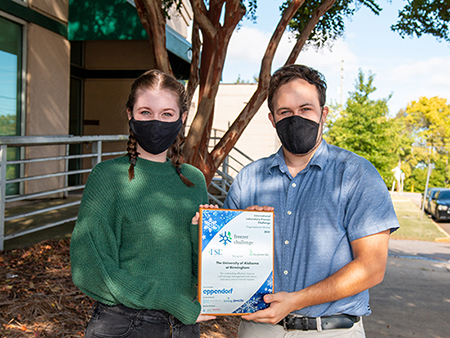Media contact: Yvonne Taunton
 Emily Colpack and Nick CiancioThe University of Alabama at Birmingham’s Green Labs Program competed against more than 40 universities and colleges globally to win the overall academic award in the annual Freezer Challenge hosted by My Green Lab and the International Institute for Sustainable Laboratories. More than 30 UAB labs competed, and UAB conserved energy equivalent to the annual energy usage of 30 homes.
Emily Colpack and Nick CiancioThe University of Alabama at Birmingham’s Green Labs Program competed against more than 40 universities and colleges globally to win the overall academic award in the annual Freezer Challenge hosted by My Green Lab and the International Institute for Sustainable Laboratories. More than 30 UAB labs competed, and UAB conserved energy equivalent to the annual energy usage of 30 homes.
“We are extremely proud of our program and our labs,” said Nick Ciancio, program coordinator at UAB Sustainability. “UAB is well-known for being a world-renowned research institution; winning the Freezer Challenge proves UAB is a global leader in lab sustainability as well.”
The Freezer Challenge is a six-month process, with points awarded for sustainable actions that promote energy efficiency, sample accessibility and sample integrity. Winners are determined by points earned and energy saved. The UAB Van Der Pol Lab was one of 12 labs awarded an individual prize. The freezer competition encourages scientists across the government, academic, biopharma and clinical sectors to implement a variety of best practices related to cold storage management in their own labs.
Ciancio and Emily Colpack, a UAB Sustainability intern, attended the I2SL conference in Atlanta to receive the award. The UAB Green Labs Program and the Van Der Pol lab were also featured in the journal Nature.
“This year was our best year for the amount of energy saved in this competition,” Colpack said. “Labs like the Van Der Pol lab were essential in helping implement more sustainable freezer practices.”
Green Labs offered free freezer filter cleanings to help reduce energy consumption and recommended other energy-saving practices.
“The labs were eager to participate not only to save more energy but also to be more sustainable,” Colpack said.
This year’s competition conserved 4.3 million kWh/year, up from 3.2 million kWh/year in 2020, which is equivalent to reducing carbon emissions by 3,000 metric tons per year.
“The energy saved isn’t just the amount of energy saved in one year; a lot of the changes the researchers made are savings that compound over several years,” Ciancio said. “For example, if a researcher changes the freezer they have from an energy-inefficient freezer to an energy-efficient freezer, that change doesn’t just save energy for the one year it was replaced — that change adds up over the years.”
Green Labs is a UAB Sustainability program that frequently partners with Environmental Health and Safety to help research labs use simple measures to lessen energy use, reduce waste and lower costs.
Any lab on the UAB campus can email greenlabs@uab.edu to be a part of the program. Labs have six months to implement changes recommended by UAB Sustainability to earn a Green Lab certification.